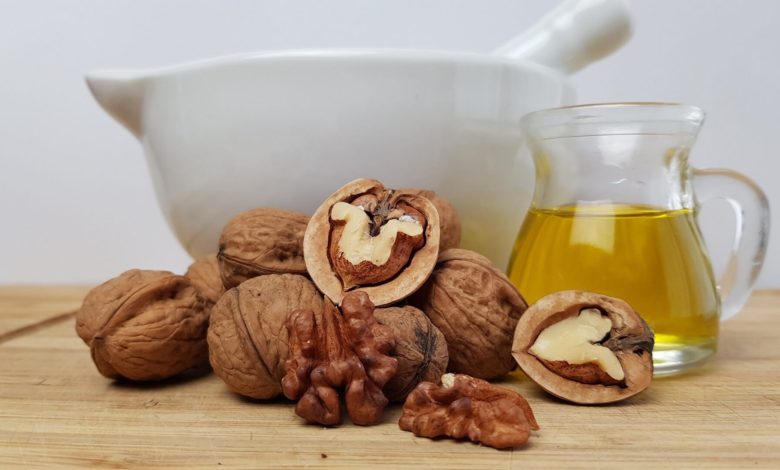Walnut Oil Benefits

Walnut is a fruit that first appeared in Central Asia and some parts of the Mediterranean region. It is known to be rich in omega-3 fats, protein, antioxidants, plant sterols, magnesium, copper, Vitamin A, D nutrients. The surface structure of a walnut is similar to the structure of a brain and is therefore also referred to as brain food. It is a food that has been consumed for centuries to strengthen and maintain brain health. Breakfast cereals, salads, pastas, desserts, energy bars, etc. It is widely used in cooking to prepare various delicious foods such as. Walnut oil is an oil obtained from walnuts and used for various purposes. The biggest producers of this oil are China, Iran, the United States, Ukraine and India. In this article, there are information about the nutritional value, uses and health benefits of walnut oil.
What is Walnut Oil?
Walnut oil is a delicious oil obtained by pressing whole walnuts. Walnut oil is available in both unrefined and refined forms for use in the kitchen in a variety of ways. Similarly, walnuts are saturated fat, monounsaturated fat, and polyunsaturated fat, which contain a combination of walnut oil, but primarily contain polyunsaturated fats. Walnut oil is an excellent source of plant-based ALA omega 3 fatty acids and 1 tablespoon provides about 100 percent of the daily recommended intake. Cold pressed unrefined walnut oil has a pronounced walnut flavor, which is ideal for making salad dressings or finishing meals, especially when fried, whereas refined walnut oil can be used in cooking and is more stable when heated. This article contains information about the nutritional values, uses and health benefits of walnut oil.
Nutrition Facts of Walnut Oil
Walnut oil is a very rich oil that contains many nutrients. Nutritional values for 1 tablespoon of walnut oil (13.6g) provided by the USDA are as follows:
- Calories: 120
- Fat: 14g
- Sodium: 0mg
- Carbohydrates: 0g
- Fiber: 0g
- Sugars: 0g
- Protein: 0g
- Omega 3 Fatty Acids: 1.4g
- To make a brief explanation about the nutrients in walnut oil;
- Carbohydrates: Walnut oil does not contain carbohydrates and therefore contains zero sugar and zero fiber.
- Fats: Walnut oil consists mainly of healthy polyunsaturated fats; Approximately 63% of the oil comes from polyunsaturated fats, 23% from monounsaturated fats and less than 10% from saturated fat. Walnut oil is an excellent source of nutrients for plant-based ALA omega-3 fatty acids that your body converts into limited amounts of EPA and DHA; 1 tablespoon of walnut oil provides 1.4 g of ALA, which is almost 100 percent of the recommended daily intake for adults 19 to 50 years old. For reference, Adequate Intake (AI) for ALA for adult males is 1.6 g per day and 1.1 g per day for females for adults. Walnut oil contains more omega-3 fatty acids per serving than canola oil, which is often cited as another excellent source.
- Protein: Walnut oil is pure oil obtained from walnuts, so it does not contain protein.
- Vitamins and minerals: Walnut oil contains a small amount of vitamin K that meets 3% of the daily need of an adult in 1 tablespoon serving. Walnut oil also contains very little vitamin E and choline, but this equates to less than 1% of the RDI per serving.
Health Benefits of Walnut Oil
The health benefits of walnut oil are related to its oil composition. Some of its benefits can be listed as follows:
Supports Heart Health
Its high concentration of polyunsaturated fat and vegetable-based Omega 3 fatty acids make walnut oil particularly beneficial for heart health. Studies have shown that omega 3 fatty acids can reduce the risk of cardiovascular disease by lowering triglycerides and increasing good HDL. Studies also show that replacing saturated fats with polyunsaturated fats can further reduce cardiovascular risk by reducing bad LDL cholesterol. ALA and natural polyphenols in walnut oil can also help lower blood pressure.
Supports Glycemic Control
One study suggests that regular consumption of cold pressed walnut oil (a little more than 1 tablespoon per day) may help lower blood sugar in Type 2 Diabetes patients, especially when replacing saturated fats. This may be due to several mechanisms, including the high concentration of antioxidants in the oil from polyphenols and the anti-inflammatory benefits of polyunsaturated fats. Polyunsaturated fats have also been shown to increase insulin sensitivity.
Reduces Inflammation
High amounts of polyunsaturated fats and omega-3 fatty acids, along with polyphenols, can help reduce chronic inflammation that contributes to a variety of health conditions such as cardiovascular disease, inflammatory skin conditions such as cancer and psoriasis. Replacing other unhealthy oils with walnut oil in a diet can help reduce overall inflammation in the body; However, more research is needed to determine exactly how much walnut oil should be consumed to result in significant health outcomes.
Allergies
Unrefined cold press or expeller pressed walnut oil should be avoided, especially for those with tree nut or walnut allergy. Fully refined walnut oil is unlikely to trigger an allergic response due to the refining process, resulting in almost complete elimination of all proteins that cause allergic reactions.
Types of Walnut Oil
There are two main types of walnut oil: cold pressed and refined. Cold pressed walnut oil is obtained by pressing the walnut without the use of heat or chemical solvents, which allows better retention of the natural nutrients (i.e. plant-based polyphenols) in the oil and a better quality, more delicious oil. The benefit of using refined walnut oil is lower cost and slightly higher smoke point. This will also be a good choice for tree nut allergy sufferers because refining eliminates allergens. (Expeller pressed oil is another extraction method similar to cold pressing, but uses a screw press that does not add any heat but causes some heat from friction). Roasted or unroasted walnut oil is also available, which is made by pressing dried or roasted walnuts before extraction, which gives the oil a richer nut flavor. This oil is typically the most expensive variety due to the extra labor involved in processing and is more of a gourmet food product.
Storage of Walnut Oil and Food Safety
Walnut oil should be stored in a cool and dark place. To extend the shelf life after opening, it should be stored in the refrigerator to prevent deterioration. Since it has a low smoke point (300-350F), walnut oil should not be used for cooking at high temperatures. Best practices are in baking. Walnut oil is a great alternative to butter or neutral oil. In addition, it can be used in cold applications such as salad dressing or sauce. If it is applying heat, refined walnut oil should be used. High quality cold pressed or fried walnut oil should be chosen if it is used primarily for flavor.





